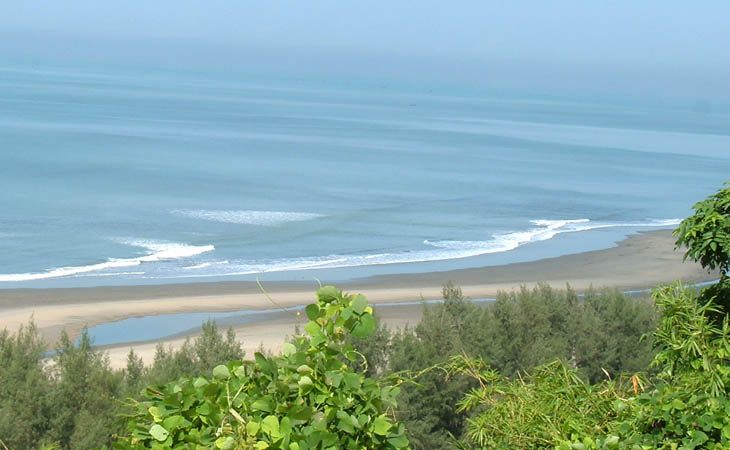- Details
- Hits: 17041
Cox's Bazar Sea Beach
Cox's Bazar is a seaside town, a fishing port and district headquarters in Bangladesh. It is known for its wide and long sandy beach, which is considered by many as the world's longest natural sandy sea beach. The beach in Cox's Bazar is an unbroken 120 kilometres (75 mi) sandy sea beach with a gentle slope. It is located 152 kilometres (94 mi) south of the industrial port of Chittagong.Today, Cox's Bazar is one of the most-visited tourist destinations in Bangladesh. It has yet to become a major international tourist destination, and has no international hotel chains because of the lack of publicity and transportation.The southern Chittagong area, including Cox's Bazar, was under the rule of Arakan kings from the early ninth century until its conquest by the Mughals in 1666 AD. When the Mughal Prince Shah Shuja was passing through the hilly terrain of the present-day Cox's Bazar on his way to Arakan, he was attracted to its scenic and captivating beauty. He commanded his forces to camp there. His retinue of one thousand palanquins stopped there for some time. A place named Dulahazara, meaning "one thousand palanquins", still exists in the area. After the Mughals, the place came under the control of the Tipras and the Arakanese, followed by the Portuguese and then the British.The name Cox's Bazar originated from the name of a British East India Companyofficer, Captain Hiram Cox, who was appointed as the Superintendent of Palonki (today's Cox's Bazar) outpost. He succeeded Warren Hastings, who became the Governor of Bengal after the British East India Company Act in 1773. Cox was mobilized to deal with a century-long conflict between Arakan refugees and local Rakhine people at Palonki. The Captain had rehabilitated many refugees in the area but died in 1799 before he could finish his work. To commemorate that, a market was established and named after him, called Cox's Bazar (market of Cox). Cox's Bazar then was first established in 1854 and became a municipality in 1869.After the Sepoy Mutiny (Indian Rebellion of 1857) in 1857, the British East India Company was highly criticised and questioned on humanitarian grounds, especially for its opium trade monopoly over the Indian Sub-Continent. However, after its dissolution on 1 January 1874, all of the company's assets including its Armed Forces were acquired by the British Crown. After this historic takeover, Cox's Bazar was declared a district of the Bengal Province under the British Crown.After the end of British rule in 1947, Cox's Bazar became part of East Pakistan. Captain Advocate Fazlul Karim, the first Chairman (after independence from the British) of Cox's Baazar Municipality, established theTamarisk Forest along the beach. He wanted to attract tourists as well as to protect the beach from tidal waves (tsunami). He donated much of his father-in-law's and his own lands as sites for constructing a Public Library and a Town Hall. He was inspired to build Cox's Baazar as a tourist spot after seeing beaches of Bombay and Karachi, and was a resort pioneer in developing Cox's Bazar as a destination. He founded a Maternity Hospital, the Stadium and the drainage system by procuring grants from the Ford Foundation and Rockefeller Foundation through correspondence. T. H. Matthews, the principal of the Dacca Engineering College (1949~1954), was a friend who had helped him in these fundraising efforts. Engineer Chandi Charan Das was the government civil engineer who had worked on all these projects. In 1959 the municipality was turned into a town committee.In 1961 the erstwhile Geological Survey of Pakistan initiated investigation of radioactive minerals like monazite around the Cox's Bazar sea-beach area.In 1971, Cox's Bazar wharf was used as a naval port by the Pakistan Navy's gunboats. This and the nearby airstrip of the Pakistan Air Force were the scene of intense shelling by the Indian Navy during the Bangladesh Liberation War. During the war, Pakistani soldiers killed many people in the town, including eminent lawyer Jnanendralal Chowdhury. The killing of two freedom fighters named Farhad and Subhash at Badar Mokam area is also recorded in history.
Cox's Bazar

